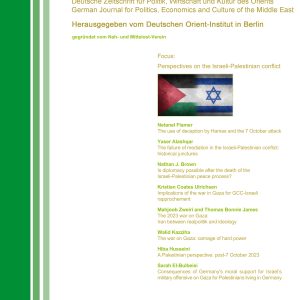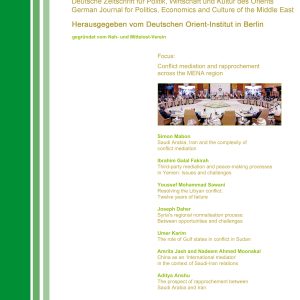Shop
Showing 81–96 of 323 resultsSorted by latest
-

Implications of the war in Gaza for GCC-Israeli rapprochement
7,90 €incl. VAT
Add to basket -

Is diplomacy possible after the death of the Israeli-Palestinian peace process?
7,90 €incl. VAT
Add to basket -

The failure of mediation in the Israeli-Palestinian conflict: historical junctures
7,90 €incl. VAT
Add to basket -

Orient I 2024: Perspectives on the Israeli-Palestinian conflict
26,00 €incl. VAT
plus Shipping Costs
Select options This product has multiple variants. The options may be chosen on the product page -

The use of deception by Hamas and the 7 October attack
7,90 €incl. VAT
Add to basket -

Prospects of rapprochement between Saudi Arabia and Iran
7,90 €incl. VAT
Add to basket -

China as an ‘international mediator’ in the context of Saudi-Iran relations
7,90 €incl. VAT
Add to basket -

The role of Gulf states in conflict in Sudan
7,90 €incl. VAT
Add to basket -

Syria’s regional normalisation process: Between opportunities and challenges
7,90 €incl. VAT
Add to basket -

Resolving the Libyan conflict: Twelve years of failure
7,90 €incl. VAT
Add to basket -

Third-party mediation and peace-making processes in Yemen: Issues and challenges
7,90 €incl. VAT
Add to basket -

Saudi Arabia, Iran and the complexity of conflict mediation
7,90 €incl. VAT
Add to basket -

Orient IV 2023: Conflict mediation and rapprochement across the MENA region
26,00 €incl. VAT
plus Shipping Costs
Select options This product has multiple variants. The options may be chosen on the product page -

Political economy of modernisation in Iraq: Challenges and consequences
7,90 €incl. VAT
Add to basket -

Re-imagining Babylon: Epistemic violence and Iraqi discourse
7,90 €incl. VAT
Add to basket -

Dawn of a new beginning: Iraq looks East in the post-Saddam era
7,90 €incl. VAT
Add to basket



